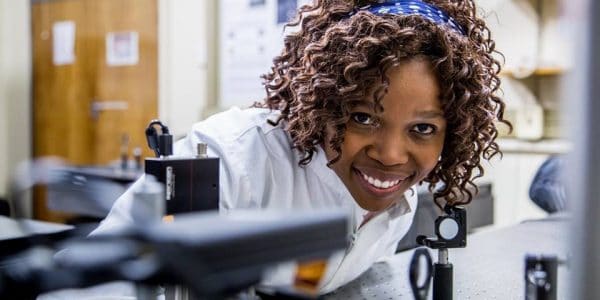Thandeka Mhlanga suffered a serious setback at the age of eight when her mother passed on. But she shrugged off the loss and doggedly pursued her education. Today Mhlanga is rated among the highly qualified scientists; is an “entrepreneurial trail-blazer” and an “inspiring innovation ecosystem builder”.
On top of that, she co-founded, Nka’Thuto EduPropeller, a non-profit outfit that “teaches the youth STEM research principles and business skills to solve their community challenges in order to develop sustainable”.
Pivotal moment
Born 31 years ago in Dundonald village in Mpumalanga, Thandeka Mhlanga moved to Ekurhuleni, Gauteng, where she started her primary and secondary schooling and re-united with her mother. But her mother died towards the end of the very same year they linked up. “This was a pivotal moment for me as it meant that my comfort zone is gone, I needed to be mature at a very young age and behave in a particular way given vulnerability at that time,” she says. Education became her “only ticket out of [her] circumstances to the world”.

Love for STEM
Miss Mhlanga was gifted in mathematics and physical science and “this made STEM related careers attractive to me”, she recalls. Upon finishing her matric, she went on to do her undergraduate degree in physics and applied mathematics at the University of Johannesburg, and her Honours physics degree at Stellenbosch University.
Science for society
While she was based at the CSIR on full-time basis as an MSc candidate researcher, she registered for her MSc Physics (Cum laude) with University of KwaZulu-Natal. Most recently, Thandeka Mhlanga did her Post Graduate Diploma in Business Administration (PDBA) with the Wits Business School. Thandeka Mhlanga loves science and believes that it should be used to resolve challenges facing humanity.
“Science is applicable in everyday life, from the moment we wake up in the morning through the noise generated by the alarm…Science is the one study that tries to explain how things work, from building blocks of what makes matter, it is through understanding the fundamental science that we are then able to apply the principles in engineering various processes to ultimately create useful products,” says Thandeka
Challenges
One of the challenges Thandeka faces is the fact that the field is male-dominated and this exposes her to an “ego-centric work environment”. She says this causes unnecessary anxiety that stifles one’s creativity and the ability to apply oneself, adding “this challenges one’s self-esteem and you can easily start questioning your abilities as a scientist, which is hostile to your productivity”.
Another challenge for Thandeka is the lack of research and development (R&D) institutions due to the fact that multinational firms currently hosted in South Africa invest in R&D in their home countries. This “means that there are no companies to absorb our research capabilities, we end up with the post-graduate degrees with no relevant work experience which in itself act as a barrier to find employment”, she says.
Miss Mhlanga also singled out the “supervisor setup” as one of the problematic areas. She says this drives away graduates from furthering their studies in science as most of the supervisors are not trained to manage people and as a result they create a hostile environment.
She says some supervisors treat graduates like their mini projects, stifle their productivity and even take credit for the output they worked hard for with no reward system. “The system also forces one to remain a student at a minimal pay for far too long, more than 5 years post your degree qualification,” she claims.
Career highlights
Thandeka Mhlanga boasts a string of achievements and awards; they are, to mention a few:
- Worked with a distinguished professor Andrew Forbes and Dr Sandile Ngcobo the digital laser inventor at the CSIR National Laser Centre.
- Took part in global stage and collaborated with international scientists as well as visited laboratories at the University of Carthage in Tunisia
- She received a travel scholarship grant from SPIE – The International Society for Optics and Photonics
- CSIR-SPIE Optics Student Chapter Chairperson for a membership of 19 post graduate students and 2 alumni in 2014.
- She has won several awards including the best MSc Poster presenter in the optics category at the South African Institute of Physics (SAIP) conference
- In 2018 she formed part of the South African delegation to attend the Commission on the Status of Women (CSW 62).
- She supported and provided input into several Ministerial Committee’s recommendations and policy development on the future evolution of South Africa’s innovation landscape working closely with Dr Blade Nzimande.
- She was a National Finalist in the 2019 Southern Africa Start-up Awards under the Female Role Model of the Year category.
Miss Mhlanga’s advice to young black women is that they should first do their research regarding the relevance of the field they choose and that it is in line with industry demand. They need to be clear as to why they are getting into science and that they should include other modules that can add value to their career choices. I would advise them that even if they chose physical sciences they must at least take a first year computer science module so that they can learn how to code given the nature of skills demand in the 4IR.







